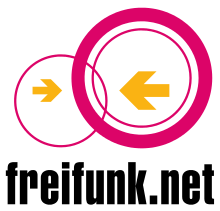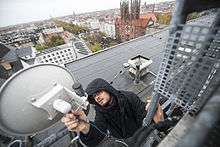Freifunk

Freifunk (German for: "free radio") is a non-commercial open grassroots initiative to support free computer networks in the German region. Freifunk is part of the international movement for a wireless community network. The initiative counts about 150 local communities with nearly 20,000 access points.[1] Among them, Hamburg, Munich, Paderborn and Düsseldorf are the biggest communities, with Hamburg connecting more than 720 access points.[2]
The main goals of Freifunk are to build a network that is decentralized, owned by those who run it and to support local communication. The initiative is based on the Picopeering Agreement.[3] In this agreement, participants agree upon a network that is free from discrimination, in the sense of net neutrality.
Technology
Like many other free community-driven networks, Freifunk uses mesh technology to bring up ad hoc WLAN networks. In a mesh network, all routers connect to each other using a special software. When a router fails, this software automatically calculates a new route to the destination. In this case, the software is called Freifunk firmware and it is based on OpenWrt and other free software. There are several different implementations of the firmware depending on the hardware and protocols local communities use. The two common protocols are OLSR and B.A.T.M.A.N.[4][5] The development of B.A.T.M.A.N. is driven by Freifunk activists.
History

One of the results of the BerLon workshop in October 2002 on free wireless community networks in Berlin and London was the Picopeering Agreement. This agreement about rationales of free networks describes how the transmission of other people's data is handled in a free network and has become a core agreement of the community. During the workshop, participants also agreed upon regular meetings in Berlin to build their own free wifi network. Ever since, there have been weekly meetings at c-base Hackerspace every Wednesday. At the same time, the German language site freifunk.net was started.
In September 2003, Freifunk activists founded the non-profit association Förderverein Freie Netzwerke e.V. to support free communication infrastructures.[6]
In the following years, the initiative became quite successful all over Germany, also because it became easier to install the Freifunk firmware on off-the-shelf wireless routers. There is a yearly Wireless Community Weekend taking place in Berlin, at c-base.
In 2012, the Berlin Freifunk community got a lot of media attention for a project called Freifunk Freedom Fighter Box. The project fights secondary liability: Secondary liability is the legal situation that makes the owners of open / non-encrypted wireless access points liable for what other users do over their internet connection. The owners can thus be forced to pay for copyright infringements of third persons just because they opened their network to the public. This legal practice led to fear and uncertainty and made many people close their access points, e.g. in cafés or in public locations. The Freifunk Freedom Fighter Box was a preconfigured access point that sent all data from the public network to Sweden over a VPN connection. In Sweden (as in most other countries), there is no secondary liability.[7]
In 2013, the Hamburg Freifunk community set up a network of more than 300 nodes,[8] using VPN tunnels to the Netherlands. Many new Freifunk communities emerged. In Berlin, the community is building a backbone network based on microwave transmission over longer distances. This project is funded by the local broadcasting corporation Medienanstalt Berlin-Brandenburg.
External links
| Wikimedia Commons has media related to Freifunk. |
- freifunk's website
- Video clip on youtube that explains the Freifunk idea or Version in German with English subtitles
- Freifunk firmware information in the Freifunk wiki (German only)
- Wireless Networking in the developing world. A practical guide to planning and building low-cost telecommunications infrastructure, 3rd edition, Feb. 2013
References
- ↑ http://www.freifunk-karte.de/
- ↑ http://freifunk.net/wie-mache-ich-mit/community-finden/ Freifunk.net Overview Map
- ↑ http://www.picopeer.net/PPA-en.html
- ↑ http://freifunk.net/worum-geht-es/technik-der-community-netzwerke/
- ↑ Wireless Networking in the Developing World. A practical guide to planning and building low-cost telecommunications infrastructure, Chapter 8: "Mesh Networking", pp. 134
- ↑ http://foerderverein.freie-netzwerke.de/organisation/ (Website of the association, in German)
- ↑ Blogpost about the Freifunk Freedom Fighter Box in English
- ↑ http://hamburg.freifunk.net/?page_id=16 (Map of the Hamburg nodes)